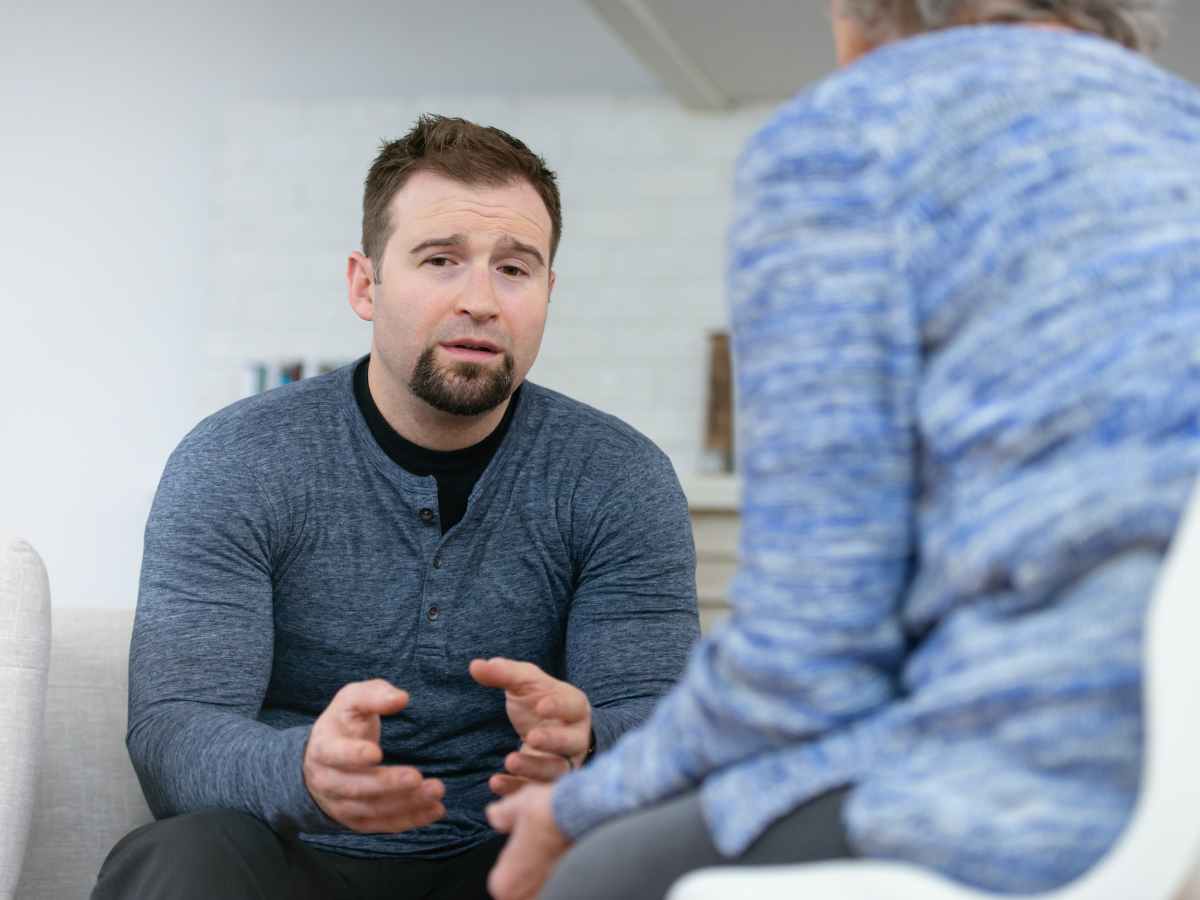
Grief Counseling
The pain you’re feeling is quite literally unimaginable and indescribable. You can barely move. It takes a herculean effort to do normal things like shower. Make yourself something to eat. Focus long enough to get through a quick Target run.
Sometimes, you realize it’s hard to even catch your breath. And the tears that come whenever they want…you’re not even feeling up to the task of managing those.
The Grieving Process Has Taken Over
Your loved one has died and you feel shaken, exhausted, and overwhelmed. There are days you feel numb. Isolated. Utterly alone. Not just because your loved one isn’t here anymore, but also because it’s hard to communicate to anyone the unique loss you’re experiencing. Even if other people in your life are feeling the same loss, your pain feels so different.
Some days, you may find a moment of laughter or happiness — a glimpse of your former self — and then you feel guilty for feeling “normal” for a minute.
Anger, Grief, and Loss
And the anger! Oh, the sharp anger you feel and you just don’t know what to do with it. It can truly feel all-consuming sometimes. Flaring up seemingly out of nowhere. It confuses you because you feel both empowered by it — after all, you can finally feel — and utterly out of control.
This pain in this grieving process is confusing and just too much.
You’re simultaneously ready to unburden yourself, fearful of letting go of the pain, and desperate to figure out how you’re going to get through this. Will it last forever? Will it always be a dull ache? Should you always be prepared for unexpected tears?

Recognizing the Symptoms of Grief
Grief manifests in a multitude of ways, and it can affect every aspect of your life.
Emotionally, you may experience intense sadness, crying spells, anger, guilt, or feelings of helplessness and despair. These emotions can come in waves, sometimes unexpectedly, and might be triggered by reminders of your loved one, like their favorite song or a significant date. You might also feel numb or detached from your surroundings, struggling to connect with others or find joy in activities you once enjoyed.
Physically, grief can take a toll on your body. Common symptoms include fatigue, changes in appetite, difficulty sleeping, and a weakened immune system. You might experience headaches, stomach aches, or muscle pain without any clear medical cause. These physical symptoms can make it challenging to perform daily tasks or maintain your usual routines. Cognitive symptoms such as trouble concentrating, forgetfulness, and confusion are also common, making it hard to focus on work or make decisions. You may find it difficult to follow a task to completion, like executing the numerous details of an estate, or experience overwhelm by the too-many options at a grocery store.
Behaviorally, you might notice changes in your habits and social interactions. Some people withdraw from social activities, preferring isolation over the company of others, while others might seek constant companionship to avoid being alone with their thoughts. You might find yourself avoiding places or activities that remind you of your loved one or, conversely, seeking out these reminders as a way to feel closer to them.
These symptoms of grief are normal, natural, and … a nuisance. The presence of these symptoms – and others – is not indicator of doing grief “wrong.” Understanding these symptoms and recognizing that they are a normal part of the grieving process can be the first step toward healing and finding ways to cope with your loss.
Will this grieving process ever end? Can you ever feel better after this loss?
You know you’re ready to stop feeling the way you do, but you’re not even quite sure how you want to feel. You don’t want to forget your loved one; you don’t want to lose connection to them; you don’t want to backfill their place in your life. But you are pretty sure you want to be able to move a little more easily. You’d like to be able to focus on a task in its entirety. You want to leave the all-consuming anger behind.
You’re also ready to think about other things, at least sometimes. To be out and about with friends and to be present in the conversation and happenings. To get your sleep back. And some normal energy levels. You’re ready to unshackle yourself from your grief.
Grief Counseling in St. Louis Can Help You Heal

Grief counseling can help you navigate this new life — your new daily routine without your loved one. Counseling after a death or loss can be used to guide you through this painful emotion; help you find practical ways forward, especially when it comes to how to handle major holidays, anniversaries, and other special events.
Especially important, grief counseling can help you find meaning in your life, even beyond the tragedy and heartbreak of loss.
We can work together to find hope that life can feel okay again, and even more than okay, that happiness can return to you.
How Do We Do That? What Does Grief Counseling Look Like?
Grief counseling doesn’t look the same for everyone. Some people have time to prepare for the death of their loved one. In other cases, the death is sudden, an absolute surprise.
Your relationship to and with the person who died can be a considerable factor in how some of our sessions will look.
Did things get left unsaid? Had you seen your loved one recently? Was it a family member or a coworker or a neighbor or a friend? All of those relationships are incredible relationships in our lives. But the type of relationship changes the fabric of how they are interwoven in our daily experience and gets consideration in the counseling experience. How old was your loved one who died and who did they leave behind? What life did they have in front of them?
Beyond those answers, there are approaches, interventions, and techniques that our Marble Wellness therapists pull from to help you process your grief and start to be able to move forward.
Techniques and Interventions Grief Therapists Use to Help Clients
Talk Therapy
Talk therapy, or psychotherapy, is a fundamental component of grief counseling. Through regular conversations, the therapist provides a safe, supportive space for clients to express their feelings, share memories, and articulate their grief. This process helps clients understand and process their emotions, facilitating healing.
Cognitive-Behavioral Therapy (CBT)
CBT helps clients identify and challenge negative thought patterns that can exacerbate their grief. By restructuring these thoughts, clients can develop healthier coping mechanisms. For example, a therapist might work with a client to replace thoughts of self-blame with more compassionate, realistic perspectives.
Mindfulness and Relaxation Techniques
Mindfulness practices, such as meditation and deep breathing exercises, help clients stay grounded in the present moment. These techniques can reduce anxiety and stress, making it easier for clients to manage their grief. Relaxation techniques like progressive muscle relaxation can also help alleviate physical symptoms of grief.
Expressive Arts Therapy
Expressive arts therapy encourages clients to use creative outlets like drawing, painting, or writing to express their grief. This can be particularly beneficial for those who find it challenging to articulate their feelings verbally. Art can serve as a powerful medium for processing and understanding emotions.
Our therapists particularly enjoy a technique called sandtray therapy. Sandtray therapy is a powerful, non-verbal therapeutic technique often used to help individuals process deep emotions, including grief. It involves the use of a sandbox and a collection of miniature figures, objects, and symbols. Clients are encouraged to create scenes or “worlds” in the sand, which can reveal inner thoughts, feelings, and experiences that might be difficult to express with words.
We actually wrote a whole blog on Expressive Arts Therapy to read!
Narrative Therapy
In narrative therapy, clients are encouraged to tell their story of loss and grief. This approach helps them make sense of their experiences and find meaning in their loss. By re-authoring their story, clients can gain a sense of control and direction.
Grief Rituals
Grief rituals can provide a structured way for clients to honor their loved ones and navigate significant dates or anniversaries. Therapists might help clients develop personal rituals, such as lighting a candle, visiting a special place, or creating a memory box.
Psychoeducation
Psychoeducation involves teaching clients about the grieving process, helping them understand that their feelings and reactions are normal. This knowledge can be comforting and empowering, reducing feelings of isolation and confusion.
Support Groups
Therapists might recommend or facilitate support groups where clients can connect with others who are also grieving. Sharing experiences with peers can provide validation, reduce feelings of loneliness, and offer new coping strategies.
Behavioral Activation
This technique involves encouraging clients to engage in activities they used to enjoy or to try new ones. By gradually reintroducing pleasurable or meaningful activities, clients can begin to rebuild a sense of normalcy and purpose.
Life Review and Legacy Work
Life review involves reflecting on the life of the deceased and the impact they had. Legacy work might include creating a scrapbook, writing letters to the deceased, or making a donation in their name. These activities help clients honor their loved one’s memory and find a sense of continuity.
We Will Get You Through This Grieving Process, Together.
One of the biggest pieces of grief counseling that makes it impactful is the idea of “together”. You have to do so much of the grief journey alone. Which is cruel because grief can already do such a powerful job of making you feel alone. But when you work with a grief therapist, you will have someone fully supporting you in this hard, awful thing you’re figuring out how to do: live without the person who died.
So, is Grief Counseling a Good Idea?
Only you can know that for sure. But, we can help you understand what to expect! In grief counseling, you will talk about memories; the impact of your loved one on your life; and fears about the future. Your grief therapist will also teach you about the grieving process and work to demystify it – at least a little bit. They’ll help you plan for the days you feel overwhelmed by the grief; the days you experience it completely raw. We’ll take the journey together. grief therapist can assist in addressing any complicated or unresolved aspects of your grief. This might include exploring feelings of guilt, anger, or unfinished business with the deceased. The therapist will work with you to find meaning and purpose after your loss, helping you to rebuild your life in a way that honors your loved one while also allowing you to move forward.
All of these questions we will explore together. We will talk about memories; the impact of your loved one on your life; fears about the future. I’ll also teach you about the grieving process and work to demystify it- at least a little bit. We’ll plan for the days you feel overwhelmed by the grief; the days you experience it completely raw. We’ll take the journey together. The goal is not to “get over” the loss but to find a way to live with it, fostering resilience and a renewed sense of hope.

Learn more about how Grief Counseling can be a helpful tool on your grief journey. Our St. Louis Grief Therapists are ready to help you with your grieving process. Check out some insights they have to offer!
Our blogs offer some additional insight, tips, and understanding of grief; how to interact with it; and ways therapy can help.
Begin Grief Counseling in St. Louis, MO
You don’t have to feel this level of pain forever. You can heal from this grief and move forward, honoring the life you’ve lost. Through therapy for grief and loss with our expert STL grief therapists. From either our Ballwin, MO counseling clinic or our Lake St. Louis, MO therapy office location, we can help you find peace and comfort. We can also chat via telehealth for online therapy in Missouri. Truly, anywhere in the state! Taking this first step is a big deal, so you are already making great progress! Just follow these simple steps and we will get started.

1. Reach out to Marble Wellness
A member of our professional Admin Team will be your first point of contact. She’ll get you set up with a good match for you on our team, and talk first appointment details.

2. Meet with one of our Grief Therapists
We have members of our team who are trained in and skilled at therapy for grief. They will work with you to personalize a plan to overcome feeling stuck and get back to being you.

3. Start to live fully and peacefully again
Whether it’s in-person, online, or park therapy, you and your therapist will use their skills and your strengths to help you start to live a peaceful and calm life, once again.
Other Mental Health Services at Marble Wellness
At Marble Wellness, our goal is simple: Counseling services designed to help set you on a path of living a more fulfilled, calm, and happy life. We specialize in anxiety, depression, trauma treatment and EMDR therapy, chronic illness, therapy for men, couples, and maternal overwhelm. Our therapists can also help new moms with various postpartum concerns, moms in the thick of parenting, and moms with teens. We can also chat from wherever you are in the state with online therapy in Missouri. No matter where you are in your journey, we would love to support you.
Have Questions About Starting Therapy?
Taking this step is a big deal, so you are already making great progress! We are here to help answer your questions and move forward.



